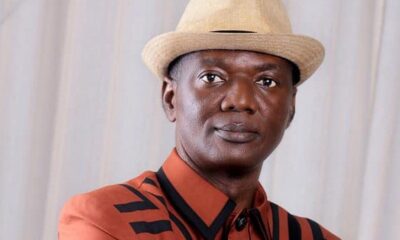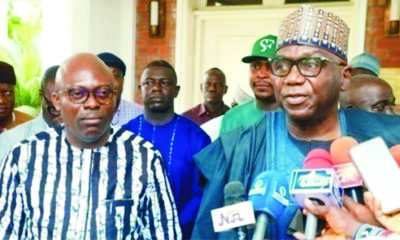Opinion
Time To Say Goodbye
Six years ago, I started
this column with a piece titled “Challenge Before the African Youth”. It was an article I wrote as a homework during my postgraduate studies in Journalism.
Strictly speaking, I had no intention whatsoever to be a columnist. I was never a practising journalist, and my job as the Business Development Director of the Rivers State Newspaper Corporation did not leave me with enough time to engage in a challenging task as writing a weekly column. But Mr Victor Tew, a gifted historian and versatile journalist, who was the Editorial Page Editor at the time fanned my zeal in starting the column. He described the first piece and indeed the subsequent ones as incisive and purposeful and encouraged me to keep up the tempo of my writing.
My major teacher in maintaining the column was the Research and Training Editor, Mr Desmond Osueke. With his formidable background in the theory and practice of journalism, he would cross the t’s, dot the i’s, and sometimes modify or completely change the titles of my articles with an amazing professional ease. And so were the likes of Messrs Boye Salau and Nelson Chukwudi who would usually go through my scripts before publication. These are inspirational workers and seasoned journalists who motivated me to keep the column going for the past years. In fact, they tried to dissuade me from ending the column. But I have to give it up to enable me prepare for my retirement from public service this year.
Mention must also be made of Messrs Arnold Alalibo and Jeminah Amachree, who at every edition of my column would not fail to comment on my piece. Without the encouragement of these people, this column would perhaps have died a long time ago.
Yes, as defined by the Oxford Advanced Learner’s Dictionary, 6th Edition: “A columnist is a journalist who writes regular articles, usually on a particular topic, for a newspaper or magazine.” But to all intents and purposes, a columnist is a spectator described by the Greek philosopher, Pythagoras, as a thinker. According to Pythagoras, those who go to Olympian games can be classified into three categories: the first, that is, the lowest, is the group that goes there to buy and sell, to make profit; the next is the one that goes to compete, to gain honours, and the last which is the best group is the one that is there as a spectator, reflecting upon and analyzing the activities of both the first and second categories.
The activities of the columnist as a thinker and philosopher uplift him or her above the slant of a sports man, an engineer, a medical doctor, an artist, a university professor, a business man, a lawyer, and so, to a very high plane where he sees political and socio-economic happenings holistically, without bias or prejudice.
So whether a columnist is writing a book review, editorial opinion, or a sports piece, he must have passion for wisdom, truth, right knowledge, frankness, and reading. And above all, he must develop a burning interest in words and writing.
The challenge of developing an article that offers a personal point of view on a topical issue every week has impressed upon me that not more than two out of every ten persons who want to be columnists would succeed. Why? These requirements, especially time and interest, for success in sustaining daily or weekly columns are highly elusive among many journalists.
When H. Allen Smith, the author of Low Man On A Totem Pole, a humour book collected and published in 1941 from his popular column was interviewed, he said: “Just between you and me, it’s tough. A typewriter can be a pretty formidable contraption when you sit down in front of it and say: ‘All right, now I’m going to be funny”.
My academic background in development economics, public policy analysis, and advertising helped me a great deal in maintaining the column over these years, but my major key to success was interest. With interest, I found time to do research for each column; with interest, I came up with fresh ideas; with interest I increased my writing skill, and with interest, I tried every week to meet deadline.
I must say that I have enjoyed tremendous benefits from writing the column for some years now. The column provided me with a unique opportunity to add my voice to political, economic, and social discourse that have guided not only the policy decisions of the various levels of government in Nigeria but also those of other nations across the world.
Since 2006 when the column was started, I have covered a wide range of topics some of which are: Planning the National Economy, The Far Country, The Privatisation Mystic, Weep Not Teachers, Truth: Just One More Step, and When the Oil is Gone … Others include The Burden of Poverty, Royal Fathers and Quest for Political Stability, Amaechi and the Challenge of Development, Food Scarcity: Perils Ahead; Civil Service of Our Dream, Gaddafi and the Burden of Karma, and Who are the Progressives?
My articles within the last one month are The Forces Against P. I. B; Asuu’s Unending Strike, Still on Nigeria’s Corruption War, Budget and Primacy of Politics, and Bomb Blasts, Too Many.
In fact, not only has the column made me more relevant to my organization, it has also, I believe, added dignity to my person.
I thank the wonderful people who urged me deeper into maintaining the column for about six years. And I salute those who kept faith with it while it lasted.
Mostly, I thank my wife, Mrs Ernestina Ochonma and my late son, Mr Vahana Ochonma for their cooperation, understanding, and loving support to a fledgling writer.
I wrote this column to help myself and my readers expand our awareness of the critical issues that are shaping the destiny of our nation and the rest of the world. But just like the season and every other thing in this world, I find today the time to end this column and say goodbye to my highly esteemed readers.
Opinion
Other Sides In Junior Pope’s Death

The tragic boat mishap of Wednesday, April 10, 2024, which claimed the lives of popular Nollywood actor, Mr John Paul Obumneme Odonwodo, popularly known as Junior Pope, and four others, has sent shock-waves across the Nigerian movie industry, and set the social media buzzing with reactions.
A contingent of 12 movie crew members had set out for a boat journey from the River Niger Cable point, a waterside jetty at Asaba in Delta State, to cross to the other side of River Niger, into Anam, a riverine community in Anambra State, for the shooting of a movie set titled ‘Another side of Life’ produced by Adanma Luke. Unfortunately, a series of avoidable events culminated the journey into an ill-fated expedition that sent fives lives to ‘the other side of life.’ The incident made the movie’s eventual ban a nullity, having played-out its symbolic meanings in real life while in the making, rather than on envisaged screens.
An avoidable incident, it exposed our society’s casual attitudes towards marine and general safety, as well as our endemic superstitions, while telling, on several flaps, other side tales of reality in the accounts of what transpired during the production, or rather, play of Adanma’s ‘Another side of Life.’
While veteran actor and Senior Adviser on Military Relations to the President of Actors’ Guild of Nigeria, Mr Steve Eboh, claimed he missed joining the ill-fated boat because he arrived too early before the crew, and had to go back, the producer, Adanma Luke, claimed she missed it because she came too late.
A journey’s jolly take-off from Asaba, Delta state, which ended tragically in its return from the other side in Anambra State, proved to be a rascally journey that showed the other side of rascality, even as T. C. Okoye claimed that pre-performing of obeisance to some marine spirits saved his life. But it was T. C. Okoye who had to hang unto a boat’s anchor in the face of death, rather than rely on the powers of the spirits he had appeased with Fanta, to await rescue from mortal men – sensible men, whose advise that one needs wear life jack during marine journeys – he had forsook, yet gave glory to his rituals after rescue.
Conversely, one may flip the flap to consider the other side of T. C. Okoye’s rituals to ruminate on other possibilities. Could the ringing of bells, spraying of money and snacks, and pouring of Fanta, have evoked the anger of the ‘marine spirits’ as rumoured, or distracted the boat driver, to the point of accident? And as reported by The Punch, what’s the significance of T. C. Okoye ‘dashing’ ritual money to innocent children whom circumstance made to be by the riverside?
Also, the argument by Mr Steve Eboh, that “If the star actors in that boat had wanted to wear life jackets, they would have been given the jackets” holds no ground, because the guild, as well as all the marine transport stakeholders, should have enforced strict safety compliance by all voyagers. It is therefore commendable that the Anambra State Commissioner of Police, Aderemi Adeoye, has ordered exhaustive investigations into the matter to determine criminal liability of all persons involved.
However, in the melee of pandemonium that accompanied rescue efforts, Nollywood celebrities, our society’s supposed role models, prioritized superstitious rescusitation over sure medical practice, rushing victims between spiritualists and hospitals, until a ‘pope’ whose work and journey had bound with the superstitious, died amidst superstition. Indeed, it’s during crises, when people care less about ‘packaging,’ that truth and the real personality of humans stand bare and naked.
While medical personnel who got their chance late had certified Jnr Pope dead, our star-persons held unto their spiritual advisers who claimed his spirit coming back to life, up until reality finally dawned that pope’s spirit has permanently crossed to the other side of life.
Regrettably, the reality has not fully dawned, otherwise three corpses shouldn’t have been buried by the riverside as dictated by spiritualists, and Jnr Pope’s family shouldn’t be worried about what would happen, as rumoured threatened of his three children, if his corpse is not buried by the riverside. However, it appears that having encountered the influence of a frontline celebrity, the spirits have turned capricious by bending divinely demands to accepting two cows, as rumoured, in exchange for Jnr Pope’s corpse being buried elsewhere.
According to the Anambra State Police Public Relations Officer, SP Tochukwu Ikenga, a team of rescuers comprising men of the Anambra State Marine Police Command, the National Inland Waterways Authority (NIWA) and the Maritime Workers Union of Nigeria, with the aid of fisher men, rescued seven persons alive to the Anambra side, while two retrieved corpses were sent across the other side, to the Delta State Marine Police Command jetty where Nollywood officials stood waiting. Of other three victims, two corpses were rescued next day, while a third was thrown out by river tides, all of whom; Abigail Fredrick (Vice Chairman of Costumer Designers Guild of Nigeria, and Akwa-Ibom State-born make-up artist), Precious Oforum (Sound engineer) and Joseph Anointing (Gaffer), have since been buried by the riverside, according to local belief.
However, what the police PRO’s statement didn’t reveal is if Jnr Pope’s corpse was sent to the other side in Delta after all the back and forth between spiritualists and medical personnel within Anambra, or if it was sent straight upon rescue to Delta state, but mysteriously found its way back to Anam, on the Anambra side.
It’s unfortunate that Nollywood which set out in its early days to expose superstitious beliefs and practices in our societies, in the hopes of enlightening the minds of the masses, and to curb the manace, has made many believe it’s rather reinforcing superstition in the ways it condicts the movie industry business.
Members of the showbiz in general, now appear to be key protagonists of superstition to the point that, being perceived as role models, so many youths have been drawn to lives of unrealistic dreams and materialism, which often get pursued through ritualism, with its attendant crimes.
Joseph Nwankwo
Opinion
The Value Of Books And Reading
The quality, quantity and diversity of books produced by a society are important indicators of that society’s level of development. . . .”–Valdehusa (1985).
April 23 of every year is marked around the world as ‘World Book and Copyright Day.’ Also known as ‘International Day of The Book,’ it is a Day set aside by the United Nations Educational, Scientific and Cultural Organisation (UNESCO), to promote reading, publishing and copyright. The Day aims to change lives through a love of books and shared reading. The theme for the 2024 ‘World Book Day’ is: “Read Your Way.” This year’s theme calls on everyone to let go of pressure and expectations, giving children a choice – and a chance to enjoy reading.
According to Audrey Azoulay, Director-General of UNESCO: “Books have the unique ability to entertain and to teach. They are at once a means of exploring realms beyond our personal experience through exposure to different authors, universes and cultures, and a means of accessing the deepest recesses of our inner selves.” Therefore, the power of books should be leveraged to combat isolation, reinforce ties between people, and expand our horizons, while stimulating our minds and creativity. It is critical to take the time to read on our own, or with our children.
Did you know that The Bible stands out as the most widely translated and distributed book worldwide? Yes, the Bible is by far the most widely translated and distributed book! Its wisdom has reached and helped more people than any other book or publication. 96.5 percent of the world’s population has access to the Bible. The Bible is available (in whole or in part) in over 3,300 languages, and the estimated number of copies of the Bible produced is 5billion, far more than any other book in history. Which other book(s) do you enjoy or have you enjoyed reading? As for me, one book I am currently enjoying reading is a 400 – 500 page healthcare handbook titled, Where there is no doctor, authored by David Werner. It is a very valuable healthcare handbook that I have found to be very very beneficial! In fact, this healthcare handbook has been fondly described by some as “the ‘Bible’ of health education,” and I strongly recommend that every family should have a copy of this book at home. Apart from this book, I also enjoy reading for pleasure children’s books, such as those I have found on booksmart.worldreader.org and www.africanstorybook.org. What about you? What books have you enjoyed or do you enjoy reading? Do you know about the book industry? There are three major sectors of the book industry. They are: publishers, booksellers and libraries.
Book publishing is channelled towards promoting learning and expanding knowledge. In a strict sense, book publishing starts from the point of conceptualisation of the ideas for the book by the author, and ends at the very last stage – the end-user (the reader). The history of book publishing in Nigeria can be traced to the establishment of the very first publishing press in Calabar, in 1846, by Rev. Hope Waddel of the Presbyterian Church of Scotland Mission. The press was used to print Bible lessons and later arithmetic books for schools.
In 1854, another Missionary based in Abeokuta, Rev. Henry Townsend of the Church Missionary Society (CMS), established a Press. Five years later (1859), he used it to print the very first newspaper in Nigeria – ‘Iwe Irohin.’ Thereafter, notable Nigerians like Herbert Macaulay established the first indigenous newspaper in 1926, called Lagos Daily News. Also, in the same year, Daily Times made its debut. In 1949, Oxford University Press (OUP) floated a sales outlet in Nigeria. This action attracted many foreign-based publishing firms to Nigeria, such as Macmillan, Longman and others. The first published book in Nigeria by OUP was released in 1963, when its local branch published ‘Ijala Ere Ode’, a Yoruba poetry genre by Oladiipo Yemitan. Aside from the foreign companies, many other home-based publishing houses were architected by indigenous entrepreneurs. The book publishing industry in Nigeria has continued to enjoy drastic growth ever since.
However, in the last few decades, the Nigerian indigenous book publishing industry has experienced a downturn due to numerous challenges facing the industry, including: book piracy, proliferation of unqualified author -.publishers, lack of capital, and inability to provide adequate numbers of high-quality books.
Other challenges include: poor reading culture, infrastructural decay, dearth of expertise, incessant rancour among the major stakeholders, and so forth.
Therefore, here are some suggestions for developing our book publishing industry in Nigeria: Stakeholders such as government, publishers, authors, regulators, booksellers, libraries, and readers should cooperate among themselves and contribute their quota immensely towards the development of a virile book publishing industry. Private investors such as banks, finance houses and influential individuals should participate, especially in terms of massive capital injection.
Ighakpe writes in from FESTAC Town, Lagos.
Daniel Ighakpe
Opinion
Let The Poor Breathe
In the history of our nation, only petroleum products have suffered more incessant increments in prices than electricity supply in all public products and services. Unfortunately, those are the two main things that impact mostly on our lives and national economy. While the increment in petroleum products’ prices is always attributed to the price of crude oil at the international market and the need to curb the scarcity by encouraging the supply, the increment in the electricity tariff has never had any justifiable reason and no service improvement afterwards. In fact, the electricity supply has gone far worse now that the tariff has gone up by over 300 percent. One of the underlying reasons for the planned electricity subsidy removal as unconsciously relayed by the Minister of Power on TVC News is the sabotage of the system by those collecting the subsidy money to maintain the assets. He said: “These are assets that we spend the country’s money on, and our brothers deliberately sabotage them. So, you can see that some people are hiding somewhere that do not want this sector to work”.
Just as the petroleum subsidy must go because the government is too impotent to handle the petroleum subsidy racketeers, the electricity subsidy has to also go at the expense of the poor masses and no one has been prosecuted for it.
When the oligarchs rob us blind, the poor masses are made to pay. The only tool that seems to be at the disposal of this government for the combat of economic challenges brought by the corruption of the political elites is to make the poor masses suffer deprivations.
No doubt, stopping the monkeys from the banana plantation is a Herculean task. But those with their thinking caps on will not need to destroy the banana plantation to ward off the monkeys. The Federal Government has taken several decisions in the last one year that are akin to milking the debilitated cow to feed the virile buffalo. The electricity tariff now has to go up to make more money for the oligarchs that sold our collective heritage to themselves and have been taking money from us for next-to-nothing service delivery.In order to win the supports of the poor masses of Nigeria, the tariff was classified and made to seem like it isn’t going to affect the poor, while the poor will invariably be the worse for it. Most of those on Band A electricity tariff, who are to be paying very exorbitantly for electricity are companies producing most of our consumables and utility items. With the high cost of electricity, the production cost will go high and consequently, the cost of the products. By the time the effects of the new electricity tariffs take full manifestation, almost everything that can make life meaningful will be beyond the purchasing powers of most Nigerians.
I can not help but to wonder what exactly is left for us to benefit as citizens of this country. Nigeria is rapidly moving towards a capitalist nation, where everything is commercialised and profit at the expense of the citizens is the priority. Medicare and even public education are now being run for profit. The government goes about with the shenanigans of education for all, while it is making education unaffordable to most Nigerians. Even the students’ loan, as badly conceived as it is, is also with interest. Those who have been in power since our democratic dispensation belong to that generation of Nigerians that the nation had been very benevolent to. They were educated for free, got paid salaries as students and given jobs on a platter after graduation. This generation of people got everything from Nigeria and unfortunately have refused to give anything back. They have not only been ungrateful to Nigeria; they have also systematically run the country aground. What a waste of investment Nigeria has made in them! While some countries in this same Africa hardly experience power outage in a year, our own B and A category would at best experience four hours of power outage in a day. These are the ruins they have led our country to in 21st century.
The timing and manner that these anti-welfare policies were introduced are indicative of lack of concern for the citizens of this country. A lot of Nigerians have lost their lives in choking circumstances. Please, let the poor breathe! While trying to rebuild Nigeria, the poor masses should not be made to feel like the eggs in the preparation of omelette. It is very obvious that you do not care about how many eggs are broken, so long as you can have the hen.
Abdulrasheed Rabana
Rabana, is a public affairs analyst .
-

 Niger Delta3 days ago
Niger Delta3 days agoRSG Seals Two Hospitals In Bonny …Set To Inaugurate Anti-Quackery Committee
-
Entertainment3 days ago
Davido Narrates How His Song Became President’s Ringtone
-

 News7 hours ago
News7 hours agoSpeak Truth To Power, Prof Omotola Tells Journalists
-

 Politics6 hours ago
Politics6 hours agoBayelsa Repositioning Local Councils For Service Delivery – D’Gov
-

 News3 days ago
News3 days agoN5.2trn Debt: FG Recovers N57bn From 10 MDAs
-

 Editorial3 days ago
Editorial3 days agoThat Odili’s Health Centre Gesture
-

 Nation10 hours ago
Nation10 hours agoWIW: Banigo Advocates Legislative Impetus
-

 News7 hours ago
News7 hours agoLet’s Fight To Save Rivers’ Soul Together

